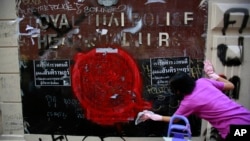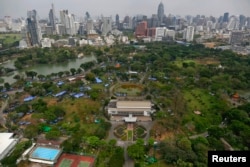BANGKOK —
In a marked shift in Thailand's ongoing political conflict, the leaders overseeing protests have called for an end to street rallies in central Bangkok. The move could open the way for talks to end the crisis. The decision follows increasing attacks on rally sites and a call from U.S. Secretary of State John Kerry for full investigation into recent violence .
Protest leader and former lawmaker Suthep Thaugsuban called for an end to protests that have shut down key centers of central Bangkok since mid-January in a campaign to force Thai Prime Minister Yingluck Shinawatra from office.
The move, which could see the reopening of main roads by Monday, is set to ease mounting political tensions that have fueled growing violence beyond Bangkok to provincial areas.
The toll from the protests, that began in November, is hundreds injured and more than 20 lives, including four small children, whose families were not involved in the protests, but who perished when gunmen fired on rally sites in Rayong and Bangkok.
U.S. Secretary of State John Kerry, in a statement, called for Thai authorities to investigate the attacks and bring to justice those responsible. Kerry said the children's deaths had been particularly horrifying.
Kraisak Choonhavan, from the opposition Democrat Party of which Suthep was also a member, said the time to end the street protests was appropriate because they failed to force Yingluck from office.
"The most important thing is the fact that the protests are not going to resolve anything if it keeps on the way it is; you know, spread out with four or five stages spending as if there is no tomorrow on entertainment and yet getting hit on a nightly basis with gunmen. So you have to try different things," said Kraisak.
A police spokesman said the protests had led to 82 ministries or state agencies being closed since November, but by last Friday 63 had managed to reopen including the finance ministry. But Suthep said the protests would still target ministries.
The protests were launched after Yingluck's government passed a controversial amnesty bill seen to benefit her older brother, Thaksin Shinawatra, who lives in exile to avoid a jail term for corruption. But critics say Thaksin is seen as the main influence in Thailand.
Yingluck is also under investigation by the National Anti-Corruption Commission (NACC) for her role as chairperson of a rice committee overseeing a multi-billion-dollar rice price support scheme critics say was engulfed by corruption.
Economist Somphob Manarangsan said Suthep has decided to look to the commission and other verdicts to decide the fate of the government.
"Now they are waiting for the independent organizations to settle the cases more peacefully and have the independent organization settle the case by law that is the reason for the Suthep group who see no reason to persist with the shut down [of Bangkok]," said Somphob.
The end of street rallies comes against growing concerns from the banking and business sector over the wider impact on the Thai economy, with investor confidence and domestic demand both sharply lower in recent weeks.
There were also growing fears of pro-government groups and militia being organized that may have led to an escalation of attacks on the anti-government protest sites in Bangkok.
But Thailand's political outlook remains unclear and is still without a sitting parliament after inconclusive February 2 elections boycotted by the Democrat Party and disrupted by protesters. Analysts say holding new elections is a key element in talks to end the crisis.
Protest leader and former lawmaker Suthep Thaugsuban called for an end to protests that have shut down key centers of central Bangkok since mid-January in a campaign to force Thai Prime Minister Yingluck Shinawatra from office.
The move, which could see the reopening of main roads by Monday, is set to ease mounting political tensions that have fueled growing violence beyond Bangkok to provincial areas.
The toll from the protests, that began in November, is hundreds injured and more than 20 lives, including four small children, whose families were not involved in the protests, but who perished when gunmen fired on rally sites in Rayong and Bangkok.
U.S. Secretary of State John Kerry, in a statement, called for Thai authorities to investigate the attacks and bring to justice those responsible. Kerry said the children's deaths had been particularly horrifying.
Kraisak Choonhavan, from the opposition Democrat Party of which Suthep was also a member, said the time to end the street protests was appropriate because they failed to force Yingluck from office.
"The most important thing is the fact that the protests are not going to resolve anything if it keeps on the way it is; you know, spread out with four or five stages spending as if there is no tomorrow on entertainment and yet getting hit on a nightly basis with gunmen. So you have to try different things," said Kraisak.
A police spokesman said the protests had led to 82 ministries or state agencies being closed since November, but by last Friday 63 had managed to reopen including the finance ministry. But Suthep said the protests would still target ministries.
The protests were launched after Yingluck's government passed a controversial amnesty bill seen to benefit her older brother, Thaksin Shinawatra, who lives in exile to avoid a jail term for corruption. But critics say Thaksin is seen as the main influence in Thailand.
Yingluck is also under investigation by the National Anti-Corruption Commission (NACC) for her role as chairperson of a rice committee overseeing a multi-billion-dollar rice price support scheme critics say was engulfed by corruption.
Economist Somphob Manarangsan said Suthep has decided to look to the commission and other verdicts to decide the fate of the government.
"Now they are waiting for the independent organizations to settle the cases more peacefully and have the independent organization settle the case by law that is the reason for the Suthep group who see no reason to persist with the shut down [of Bangkok]," said Somphob.
The end of street rallies comes against growing concerns from the banking and business sector over the wider impact on the Thai economy, with investor confidence and domestic demand both sharply lower in recent weeks.
There were also growing fears of pro-government groups and militia being organized that may have led to an escalation of attacks on the anti-government protest sites in Bangkok.
But Thailand's political outlook remains unclear and is still without a sitting parliament after inconclusive February 2 elections boycotted by the Democrat Party and disrupted by protesters. Analysts say holding new elections is a key element in talks to end the crisis.





